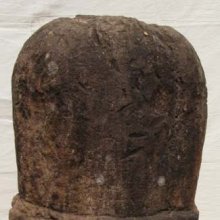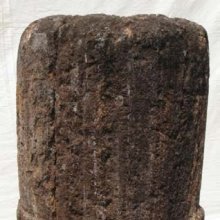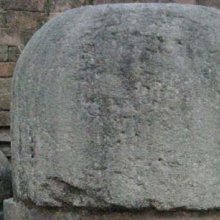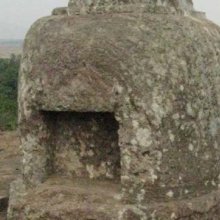Anda, Aṇḍa, Amda, Aṇḍā, Anḍā: 26 definitions
Introduction:
Anda means something in Buddhism, Pali, Hinduism, Sanskrit, Marathi, Jainism, Prakrit, Hindi, biology. If you want to know the exact meaning, history, etymology or English translation of this term then check out the descriptions on this page. Add your comment or reference to a book if you want to contribute to this summary article.
Anda has 24 English definitions available.
Images (photo gallery)
(+4 more images available)
Languages of India and abroad
Sanskrit dictionary
[Deutsch Wörterbuch]
Source: Cologne Digital Sanskrit Dictionaries: Böhtlingk and Roth Grosses Petersburger WörterbuchAṇḍa (अण्ड):—m. [Die Uṇādi-Affixe 1, 113.]
1) Ei [Hemacandra’s Abhidhānacintāmaṇi 1319.] (nach den Sch. m. n.) n. [Amarakoṣa 2, 5, 37.] [Hemacandra’s Anekārthasaṃgraha 2, 110.] [Medinīkoṣa ḍ. 1.] [Manu’s Gesetzbuch 1, 9. 12.] [Pañcatantra 75, 24. 84, 17.]; vgl. aṇḍaja . —
2) Hode n. [Trikāṇḍaśeṣa 3, 3, 110.] [Hemacandra’s Abhidhānacintāmaṇi 611.] [Anekārthasaṃgraha 2, 110.] [Medinīkoṣa] m. n. [Vaijayantī] beim Sch. zu [Hemacandra’s Abhidhānacintāmaṇi 611.] kāṣṭhābhyāṃ cūrṇitāṇḍadvayaḥ [Hitopadeśa 49, 16.] —
3) n. Hodensack [Trikāṇḍaśeṣa 3, 3, 110.] —
4) n. semen virile [VIŚVA im Śabdakalpadruma] —
5) n. Moschus [Śabdakalpadruma]; vgl. aṇḍajā . —
6) ein Beiname Śiva’s [Mahābhārata 12, 10358]; vgl. aṇḍadhara . — Vgl. āṇḍa; über die entsprechenden Formen in den verwandten Sprachen s. [J. GRIMM] in den Abh. [?d. Königl. Amarakoṣa d. W.] zu Berlin, [1845. S. 219. fg.]
--- OR ---
Āṇḍa (आण्ड):—
--- OR ---
Ānda (आन्द):—m. Name einer verachteten Menschenklasse [Vājasaneyisaṃhitā 30, 16.] Nach [Mahīdhara] so v. a. bandhanakartar .
--- OR ---
Aṇḍa (अण्ड):—
1) [Sūryasiddhānta 12, 14. 21. 32.]
Source: Cologne Digital Sanskrit Dictionaries: Sanskrit-Wörterbuch in kürzerer FassungAṇḍa (अण्ड):——
1) *m. n. — a) Ei [52,1,2.152,1.268,17.] — b) Hode [148,9.] — c) *Hodensack. — d) *männlicher Same. — e) *Moschus. —
2) m. Beiname Śiva's
--- OR ---
Āṇḍa (आण्ड):——
1) n. Ei. —
2) m. Du. die Hoden. —
3) f. ī Hode.
--- OR ---
Ānda (आन्द):—m. eine best. verachtete Menschenklasse.
Sanskrit, also spelled संस्कृतम् (saṃskṛtam), is an ancient language of India commonly seen as the grandmother of the Indo-European language family (even English!). Closely allied with Prakrit and Pali, Sanskrit is more exhaustive in both grammar and terms and has the most extensive collection of literature in the world, greatly surpassing its sister-languages Greek and Latin.
See also (Relevant definitions)
Starts with (+215): Amdaa, Amdabamda, Amdadarbaru, Amdade, Amdadhari, Amdadumdi, Amdaga, Amdaga, Amdagara, Amdagarike, Amdagarti, Amdagati, Amdage, Amdagedi, Amdagedisu, Amdagedu, Amdagey, Amdagolisu, Amdagollu, Amdaisu.
Ends with (+2764): Aaru moole kaanda, Aaru-moole-kaanda, Aattuparanda, Abanda, Abaraskanda, Abhaktacchanda, Abhaktachchhanda, Abhanda, Abhandakubhanda, Abhayananda, Abhicamda, Abhigamadanda, Abhigamanadanda, Abhikranda, Abhinanda, Abhinishyanda, Abhisanda, Abhishyanda, Abhiskanda, Abhivamda.
Full-text (+194): Andakosha, Amdaga, Andalu, Andira, Andaka, Andaja, Andavardhana, Andakataha, Putyanda, Andadhara, Adhyanda, Andayana, Andasu, Andavriddhi, Jalandaka, Kukkutanda, Andakoshaka, Amdaa, Andakotarapushpi, Andakarshana.
Relevant text
Search found 55 books and stories containing Anda, Aṇḍa, Amda, Aṇḍā, Anḍā, Āṇḍa, Ānda, Aṃḍa, Aṃda, Āṃḍa; (plurals include: Andas, Aṇḍas, Amdas, Aṇḍās, Anḍās, Āṇḍas, Āndas, Aṃḍas, Aṃdas, Āṃḍas). You can also click to the full overview containing English textual excerpts. Below are direct links for the most relevant articles:
Garga Samhita (English) (by Danavir Goswami)
Verse 1.2.25 < [Chapter 2 - Description of the Abode of Śrī Goloka]
Verse 1.2.26 < [Chapter 2 - Description of the Abode of Śrī Goloka]
Verse 2.12.18 < [Chapter 12 - Subduing Kāliya and Drinking the Forest Fire]
Chandogya Upanishad (Shankara Bhashya) (by Ganganatha Jha)
Section 3.19 (nineteenth khaṇḍa) (four texts) < [Chapter 3 - Third Adhyāya]
Historical Elements in the Matsya Purana (by Chaitali Kadia)
Subject matter of the Purāṇas < [Chapter 1 - An Introduction of the Purāṇas]
Stupas in Orissa (Study) (by Meenakshi Chauley)
The Anda Portion (of the Stupa) < [Chapter 4]
Minor Votive Stupas at Lalitagiri < [Chapter 4]
Minor Votive Stupas at Udayagiri < [Chapter 4]
Chandogya Upanishad (Madhva commentary) (by Srisa Chandra Vasu)
Brihat Samhita (by N. Chidambaram Iyer)
Related products







